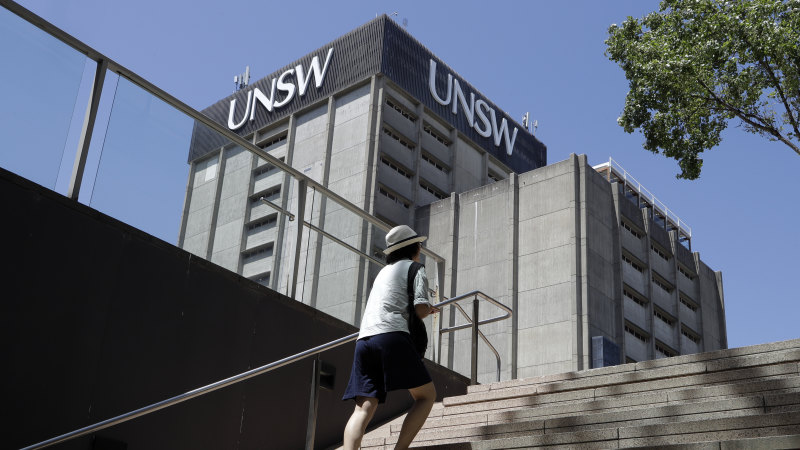Save articles for later
Add articles to your saved list and come back to them any time.
The University of NSW is urging students and academics to report any “foreign government interference” witnessed in class, as human rights groups warn that free speech and academic freedom are increasingly under threat.
In emails sent in June and July, the university asked staff and students to come forward with any complaints of such interference, referring to Human Rights Watch reports that pro-Beijing groups had intimidated those critical of the Chinese Communist Party.
UNSW has told students to be on the lookout for foreign government harassment. Credit: Ryan Stuart
The university warned students that harassing or making threats against staff or fellow students was a breach of code of conduct rules, as well as reporting on comments or behaviour back to a foreign government.
New reports of harassment and intimidation of UNSW staff and students also have emerged since the start of the awareness campaign, deputy vice chancellor Professor George Williams has confirmed.
“It has a chilling effect,” Williams said. “As you can imagine, that’s the sort of thing we look out for very carefully because a foreign government has tremendous power. ”
Citing privacy reasons, UNSW declined to disclose the number of complaints it has received as a result of the communications or if anyone has faced disciplinary action.
UNSW deputy vice chancellor Professor George Williams says intimidation and harassment of students and staff has a “chilling effect”. Credit: AP
Human Rights Watch Australia director Daniela Gavshon said universities should be bolstering their freedom of speech and foreign interference measures now borders are open and COVID-19 restrictions have ended.
Gavshon said Human Rights Watch was currently meeting with Australian universities about their policies and changes since their 2021 report, while the organisation’s China team had ongoing work in the area.
“Freedom of speech and academic freedom are cornerstones of academic freedom, and if those are being put at risk it’s really important to cut it off,” she said.
In 2020, UNSW was widely criticised when it deleted social media posts and altered an online article following an online protest from Chinese nationalists. The backlash was fuelled by a Sydney-based lawyer with links to the Chinese consulate, who called for students to launch a campaign against UNSW to correct the university’s political views.
The original Twitter post linking to the article, which was based on comments from Human Rights Watch Australia director and UNSW adjunct lecturer Elaine Pearson, quoted her warning that “now is a pivotal moment to bring attention to the rapidly deteriorating situation in Hong Kong”.
Williams said the university was rightly criticised at the time for the deletion of the tweet, but it was not the catalyst for the current action on free speech.
“The Human Rights Watch report was a real wake-up call for the university and the whole sector,” he said.
“We see it as a bedrock commitment to our students that they will be able to speak freely in classes.”
The University of Sydney has recorded a sharp increase in complaints about incursions on freedom of speech or academic freedom from five in 2021 to 25 in 2022. So far this year, the university has received 15 complaints. But it says it’s not aware of any complaints that relate directly to foreign interference.
A spokeswoman for the university said the institution had prioritised pre-emptive communication with students about freedom of speech and foreign interference before it becomes an issue.
International students are offered face-to-face training on free speech and the Australian context, as well as “engaging with civility”, she said.
“Over the past few years we’ve prioritised pre-emptive communication with our students about these matters, before they might become an issue,” the spokeswoman said.
“Our Student Welcome Guides and our Vice-Chancellor’s annual commencement messages to students and staff emphasise our deep commitment to the principles outlined in our Charter of Freedom of Speech and Academic Freedom.”
A spokesman for University of Technology Sydney said the institution had not received any complaints relating to freedom of speech in 2021 or 2022.
Most Viewed in Politics
From our partners
Source: Read Full Article



